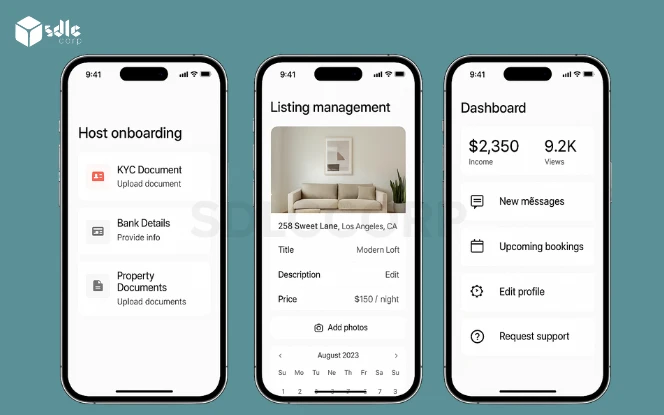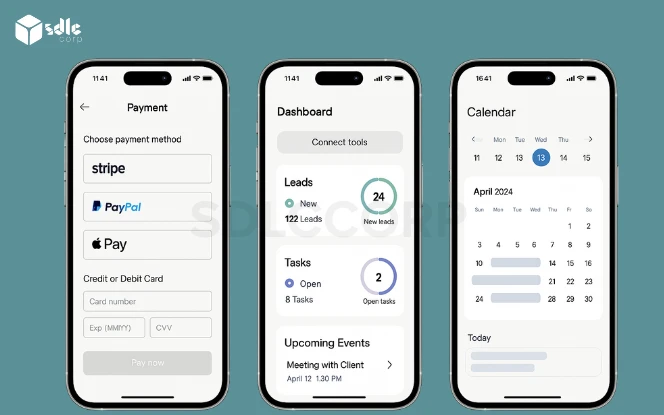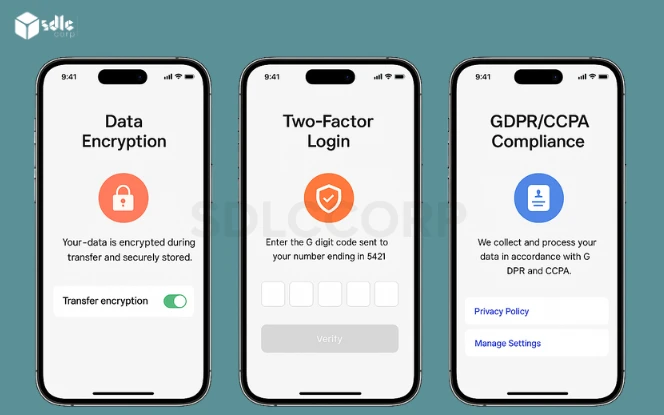Airbnb changed how people book short-term stays. The platform offers flexible living, affordable rooms, and quick access to unique spaces around the world. Because of this rise in demand, many founders now want to build their own Airbnb-like applications.
This guide explains the cost to develop an app like Airbnb, the features you need, the tech stack, and the development process. It also covers monetization options and the factors that affect your overall budget. The goal is simple: help you plan your product with clarity and confidence.
Why Build an App Like Airbnb?
An Airbnb-like app is a digital platform that connects travelers (guests) with hosts offering short-term rentals or stays. These apps typically include user registration, property listings, booking and payment options, and support features that facilitate safe and secure interactions between both parties.
Before diving into the cost, it’s important to understand the business potential of vacation rental apps:
- Growing Market: The global vacation rental market is projected to reach $113.9 billion by 2027.
- High ROI: Airbnb reportedly made over $8.4 billion in revenue in 2023.
- Scalability: These platforms can easily scale to support multiple cities or countries.
- Asset-Light Model: No need to own physical property to run the platform.
With increasing demand for contactless travel, customized stays, and real-time bookings, now is a great time to consider developing a travel app like Airbnb.
Core Features of an App Like Airbnb
An Airbnb clone app requires different feature sets for three primary users: Guests, Hosts, and Admins.
1. For Guests

Signup/Login: Email, phone, or social login.
Advanced Search: Property type, dates, budget, amenities, and location filters.
Map View: Easy visual search for nearby stays.
Secure Payments: Card, wallet, and local payment options.
Wishlist: Save properties for later.
In-App Messaging: Chat with hosts in real time.
Reviews & Ratings: Check previous guest experiences.
Notifications: Alerts for bookings, reminders, and offers.
2. For Hosts

Host Verification: Submit ID and property proof.
Listing Management: Add descriptions, photos, and prices.
Calendar Control: Manage availability and pricing.
Booking Management: Accept and reject requests.
Earnings Dashboard: Track revenue and payout history.
Support Section: Manage issues or disputes.
3. Admin Panel

User Management: Review guest and host accounts.
Listing Approval: Verify property authenticity.
Payment Control: Track commissions and payouts.
Analytics: Monitor revenue, bookings, and platform activity.
Content Tools: Manage FAQs, policies, and announcements.
4. For Platform Integrations

Following competitor features (Appinventiv + Apptunix):
Stripe, PayPal, Apple Pay
Google Maps Integration
Google Calendar / iCal Sync
Twilio for SMS
Salesforce / Zendesk for CRM
These tools improve trust, automation, and accuracy.
5. For Security & Compliance

Competitors highlight security heavily, so your platform should include:
End-to-End Encryption
Two-Factor Authentication
GDPR / CCPA Compliance
Fraud Detection Tools
Identity Verification with Selfie or Document Scan
A secure platform builds trust quickly.
6. For Mobile App Experience

- Offline Access – View bookings and saved items offline.
- Biometric Login – Use Face ID or fingerprint to log in.
- App Walkthrough – Guide new users through features.
- Dark Mode – Toggle light/dark themes for comfort.
7. For Analytics & Monetization

- Dynamic Pricing – Auto-adjust prices based on trends.
- User Analytics – Track behavior for UX improvement.
- Ad Promotions – Let hosts boost listing visibility.
- Revenue Forecasting – Predict earnings with insights.
Technology Stack
Using the right technology stack is key to building a secure, scalable, and user-friendly app like Airbnb. Tools like Flutter or React Native accelerate mobile development, while React.js ensures a fast, responsive web experience. Node.js or Laravel provides a stable backend, and AWS offers reliable cloud-based infrastructure. Stripe and OAuth 2.0 enable secure payments and authentication, while Firebase supports real-time updates and analytics. A solid tech foundation guarantees smooth performance, low maintenance, and long-term scalability as your platform grows.

Choosing the right tech stack is crucial for performance, scalability, and efficiency. Explore the latest tools driving innovation in 2025 in our blog on How to Start a Marketplace Development Company?
Detailed Cost Breakdown for an Airbnb Style App
Building an app like Airbnb involves several stages design, development, integrations, security, testing, and deployment. Each stage adds to the overall budget depending on the features you select and the market you plan to launch in.
The table below gives a clear, structured breakdown of how much your Airbnb-style app may cost at different complexity levels. This helps you plan investment, choose the right scope for your MVP, and scale based on user feedback.
| App Tier | Estimated Cost (USD) | Timeline | Purpose | Key Features Included |
|---|---|---|---|---|
| Basic MVP | $20,000 – $30,000 | 4 – 6 Weeks | Early launch and validating your idea | Login, simple listings, basic search filters, secure payments, booking flow, and essential admin panel. |
| Standard Product | $35,000 – $60,000 | 8 – 12 Weeks | Scaling to multiple cities and improving engagement | Advanced filters, wishlists, in-app chat, push notifications, multi-currency support, and better admin controls. |
| Advanced Platform | $60,000 – $120,000 | 3 – 6 Months | Growing into a competitive global marketplace | AI recommendations, AR/VR tours, dynamic pricing, IoT smart lock integration, real-time analytics, and role-based access. |
| Enterprise Ecosystem | $120,000 – $250,000+ | 6 – 12+ Months | Large-scale brands and multi-country operations | Microservices architecture, CRM/ERP integrations, custom dashboards, audit logs, advanced analytics, multi-country compliance, and dedicated support. |
Factors Affecting Airbnb App Development Cost
- Advanced Search and Recommendation Algorithms – Personalized search experiences increase engagement. Algorithms powered by machine learning require development, data training, and testing, raising complexity and cost.
- AR & VR Integration – Enable users to explore 360° virtual property tours. These immersive features significantly enhance UX but require 3D modeling and integration tools.
- AI Chatbots – Intelligent bots can automate 70% of guest and host interactions, reducing dependency on human support teams.
- Smart Home Integration (IoT) – Allow smart locks, thermostats, and cameras to sync with the host dashboard. It adds a competitive edge but increases integration complexity.
- Third-Party APIs – Incorporating APIs for payments (Stripe, Razorpay), geolocation (Google Maps), SMS/email, and calendar syncing (Google/iCal) affects cost.
- UI/UX Design – A visually appealing, easy-to-navigate app enhances usability and retention. Designing for both dark/light mode, mobile responsiveness, and animation adds to the effort.
Monetization Strategies for an App Like Airbnb
Monetizing a niche vacation rental platform like Airbnb goes beyond just product sales. By leveraging multiple revenue streams, you can scale sustainably while offering value to both customers and sellers. Here are the most effective strategies you can implement:

Commission Fees: Earn from every booking.
Subscription Plans: Let hosts upgrade visibility.
In-App Ads: Promote local services or travel products.
Add-On Services: Cleaning, insurance, airport pickup.
Promo Listings: Paid boosts for hosts.
Dynamic Pricing Tools: Charge hosts to optimize earnings.
Affiliate Revenue: Travel insurance, car rentals, tours.
A multi-stream approach ensures stable revenue.
Step-by-Step Process to Build an App Like Airbnb
Building a high-performance vacation rental app like Airbnb requires a structured, end-to-end process. Each phase ensures that your rental platform is reliable, scalable, and tailored to user needs.

1. Discovery & Research
The process begins with market analysis, competitor benchmarking, and stakeholder discussions to define the app’s core purpose and target audience.
2. Requirement Analysis
Functional and technical requirements are documented to clarify app features, architecture, third-party integrations, and platform scope.
3. UI/UX Design
User flows, wireframes, and visual prototypes are created to ensure a seamless and intuitive shopping experience across all screens.
4. App Architecture & Planning
The technical foundation is laid by structuring APIs, data models, and system logic to support real-time interactions and scalability.
5. Frontend & Backend Development
Teams simultaneously work on coding user interfaces and implementing backend services, ensuring synchronization and performance optimization.
6. Testing & QA
End-to-end testing covers usability, security, cross-device compatibility, and speed to ensure a smooth and bug-free launch.
7. Deployment & Post-Launch Support
The app is published on app stores, followed by real-time monitoring, regular updates, and feature enhancements based on user feedback.
For a deeper breakdown of timelines across different development stages planning, design, development, and testing check out our detailed guide on How Long It Takes to Develop an App.
Conclusion
Building an Airbnb-like app is a strategic investment. The cost varies based on features, platform complexity, and the development approach. With a simple MVP, you can enter the market quickly and scale by adding advanced features later.
For the best results, focus on smooth navigation, strong security, accurate listings, and consistent user experience. These elements drive trust and help your platform grow.
If you want expert guidance, SDLC Corp can build a secure and scalable rental marketplace with all modern features required for long-term success.
Related Blogs You May Also Like
FAQ's
1. How much does it cost to build an app like Airbnb?
The cost starts around $20,000 for a basic MVP and can reach $250,000+ for an enterprise platform. The final amount depends on features, integrations, design depth, security needs, and the location of your development team.
2. What features are essential for an Airbnb-like app?
You need user login, property listings, advanced search, booking flow, secure payments, reviews, messaging, host dashboards, admin controls, and notifications. Advanced versions add AI recommendations, dynamic pricing, AR/VR tours, and IoT smart locks.
3. How long does it take to develop an Airbnb-style app?
A basic version takes 4–6 weeks, a standard version 8–12 weeks, and an advanced or enterprise solution may require 3–12 months depending on complexity.
4. Do I need two separate apps for hosts and guests?
Not always. You can build one app with separate dashboards for both roles. Larger platforms often use a combined structure to simplify onboarding and reduce cost.
5. What tech stack is best for building an Airbnb-like platform?
Competitor-backed and industry-favored stacks include React Native or Flutter for mobile and Node.js, Django, or Laravel for backend. Cloud setups usually run on AWS or Google Cloud. Databases include PostgreSQL, MySQL, or MongoDB.
6. Can the app support multiple languages and currencies?
Yes. Localization and multi-currency modules are easy to integrate during development. They help your platform reach global markets.
7. How is secure payment processing handled?
Payments are managed through gateways like Stripe, PayPal, Razorpay, or Apple Pay. These solutions follow PCI-DSS standards and keep user data secure.
8. Does the app need compliance like GDPR or CCPA?
Yes. Any platform handling personal data or transactions must follow data protection laws. Your app should include encryption, consent systems, and safe data storage practices.





